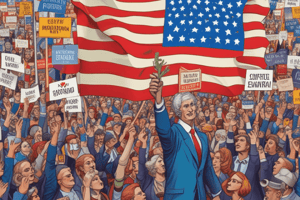Podcast
Questions and Answers
What is the main purpose of political competition in elections?
What is the main purpose of political competition in elections?
The main purpose is to select future leaders and ensure accountability.
What are some negative aspects of electoral competition?
What are some negative aspects of electoral competition?
Negative aspects include disunity, factionalism, and the use of dirty tricks.
Why might capable individuals choose not to enter politics?
Why might capable individuals choose not to enter politics?
They may be deterred by the unhealthy competition and negative environment.
In an ideal world, what motivates political leaders to serve the people?
In an ideal world, what motivates political leaders to serve the people?
What two approaches could improve political leadership?
What two approaches could improve political leadership?
Who ultimately decides the reward or punishment for political leaders?
Who ultimately decides the reward or punishment for political leaders?
What is the role of party-politics in local communities?
What is the role of party-politics in local communities?
How does electoral competition incentivize political parties?
How does electoral competition incentivize political parties?
What is a risk of relying solely on political leaders’ sense of duty?
What is a risk of relying solely on political leaders’ sense of duty?
Why did the Constitution makers support free competition in elections?
Why did the Constitution makers support free competition in elections?
Flashcards are hidden until you start studying
Study Notes
Political Competition in Elections
- Elections are fundamentally shaped by political competition, primarily among political parties and candidates at the constituency level.
- Lack of competition can render elections meaningless, undermining their purpose.
Demerits of Political Competition
- Electoral competition can foster disunity and factionalism within localities.
- Accusations and negative campaigning among parties are common, leading to prevailing sentiments against 'party-politics'.
- The focus on winning may hinder the development of sensible, long-term policies.
- Some potential leaders abstain from political involvement due to the unhealthy competitive environment.
Constitutional Perspectives
- Constitution makers recognized the issues posed by political competition yet opted for a system allowing free electoral competition, believing it benefits long-term governance.
Ideal vs. Real Political Environment
- In an ideal scenario, political leaders would inherently prioritize public service over personal ambition, eliminating the need for competition.
- Contrary to this ideal, real-life political leaders resemble other professionals, often motivated by the pursuit of power and position.
Addressing Real-Life Political Challenges
- Enhancing the knowledge and integrity of leaders is one approach to improving governance.
- More pragmatically, establishing a system where leaders are rewarded or punished based on their service to the public is crucial.
Role of Electoral Competition
- The ultimate arbiter of political performance is the electorate; regular electoral competition incentivizes political parties and leaders to address public concerns.
- Politicians who prioritize public satisfaction improve their chances of electoral success, creating an accountability mechanism.
- Similar to market dynamics, where customer satisfaction drives service quality, political competition compels parties and leaders to cater to the needs of the populace, despite internal divisions and potential backlash.
Studying That Suits You
Use AI to generate personalized quizzes and flashcards to suit your learning preferences.




